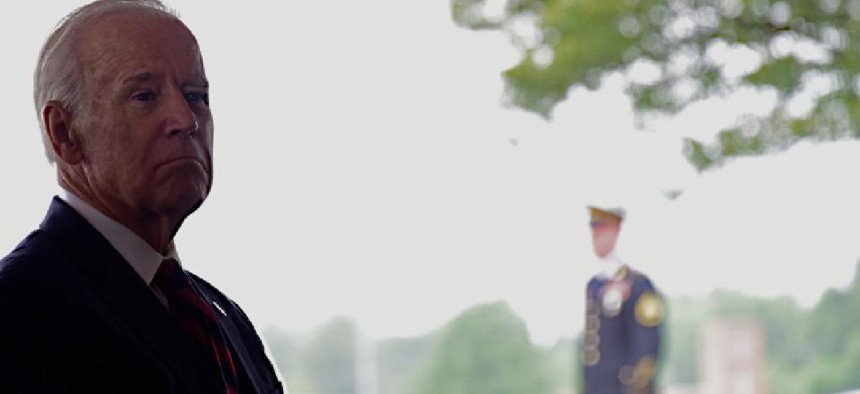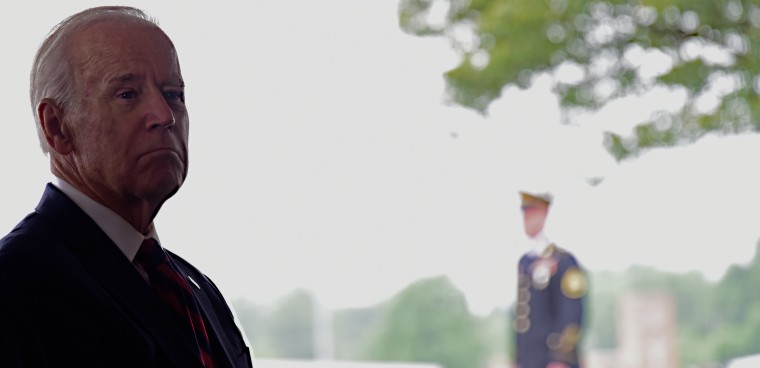What to expect from Joe Biden’s DOD

President-elect Joe Biden’s national security team is taking shape. FCW talked with experts to understand exactly what’s at stake for the Defense Department’s modernization efforts over the next four years.

Joe Biden in May 2017 during the Memorial Day Ceremony at Delaware Veteran's Memorial Park. (Photo credit: Staff Sgt. Andrew Horgan/U.S. Air National Guard)
As of this writing, Biden has not named a secretary of defense, although Michele Flournoy has been tipped by Pentagon watchers as a likely candidate. She would be the first woman to serve as defense chief and brings a long resume including a stint as undersecretary of defense for policy under the Obama administration. Jeh Johnson, the former homeland security chief and former DOD general counsel is also considered as a strong candidate. Biden's other national security picks reflect a strong institutional bent, with a focus on experience working in government.
Whomever Biden picks for the top job and for senior posts requiring Senate confirmation, it's expected that the Biden DOD won't see the same rate of high-profile and often abrupt leadership churn that is a signature of the Trump administration.
"It was debilitating," Christian Brose, former Senate staff director and current chief strategy officer for Anduril Industries, told FCW, "because the types of decisions that I'm talking about where you really have to make difficult choices between what to fund and what not to fund, what to scale and what to divest from, these are choices with real consequence and with political risk and sacrifice."
Biden's team has "deep benches of talent" Brose said, adding that "they will, or should be able to, get their core teams confirmed or in place quickly and get to work and get to work with a degree of stability so that you're not seeing the kind of senior leadership churn that we've experienced for the past four years."
Regardless of administration, Brose warned that senior leaders have to do more than talk about innovation without substantive investment.
"What are they spending time on and what are they spending money on? There's a lot of rhetoric, a lot of people are talking a big game about, defense, innovation and change and transformation and the like," Brose said.
Rep. Anthony Brown (D-Md.), the vice chair for the House Armed Services Committee is looking for improvements on the diversity and inclusion front in a Biden administration.
"Diversity and inclusion have to be integral to any modernization program. And I've been focusing a lot...on diversifying the Pentagon, the armed forces generally, and have been working with the defense industrial base to do the same," Brown said.
"There is a lack of diversity in our defense leadership. Everything from combat arms through combat service support at our highest levels of leadership, there's a lack of diversity. And I think we need to focus on that as we are focusing on the efforts we need to take to modernize our fighting force," Brown said.
When asked about the initiatives Mark Esper, now former defense secretary, kicked off over the summer following the George Floyd protests, Brown said they were insufficient. Brown championed a provision in the 2021 National Defense Authorization Act that would require the military services to install chief diversity officers at the secretariat level.
"When you talk about modernization, you're talking about emerging technologies, innovation and creativity. And one of the components to creating a more innovative sort of approach to how you solve problems and how you deliver solutions is you have to diversify the talent that you have participating in that process," he said.
"I don't think it's sufficient," Brown said, "The most important thing that we can do and should do...is we have to create chief diversity officers for both the department and the service components. A chief diversity officer who reports directly to the secretary of Defense and the service secretaries."
Budget pressure
Budget stability is a big issue for contractors and the military services, with pressure expected to come from deficit hawks and from opponents of big defense budgets to pare down spending to make up for huge expenditures in the pandemic response.
"This is the last year of a two year budget agreement. So to be able to have an understanding of what is going to be that top line and what the priorities are under that on a consistent basis will drive better outcomes," Wesley Hallman, the senior vice president of strategy & policy for the National Defense Industrial Association, told FCW.
"Both the services and industry really want to see a clear signal, clear resourcing signal that they can plan to, because it's so much easier to do long term planning when you have that stability and [can] get good outcomes on the back end."
Mark Cancian, a senior adviser with the Center for Strategic and International Studies’ international security program predicts a remarkable amount of continuity between administrations when it comes to the Department of Defense.
"There will be a lot of continuity," Cancian said. "And that's important because that then sets a path for a defense budget and the modernization effort that's going to be again similar to the Trump Administration."
If there are cuts, Cancian said that the Army could be hardest hit.
"I think the Army modernization program is going to be under particular pressure," Cancian said. "If you're focusing particularly on China, which is primarily a maritime and air theater, then the Army has less of a role."
Data as a breakout star
DOD released its long-awaited data strategy in October, and the Biden administration could build on that to make data and analytics a key priority across the department, said Tara Murphy Dougherty, CEO of Govini, a decision science and data analytics firm.
"They're going to be looking to not just analyze data, but to use it for decision-making so that they can understand for big spending on defense, are we getting the national security that we expect? Do we get the warfighting capabilities that we're looking for? Because they aren't just going to measure success by the number of ships in the Navy or the number of planes in the Air Force," Murphy Dougherty said.
As a result, the Biden administration could be in a position to level up the Defense Department’s data analytics capabilities to match rhetoric about improving human decision-making, especially if the defense team commits to implementing the recently released data strategy.
"That will help them move really quickly in an area where certainly America's competitiveness, vis-a-vis China in particular, in this case has been not as solid," Murphy Dougherty said. "The fundamentals are there. And the fundamentals, frankly, are nonpartisan. It treats data like a strategic resource, [addresses] the cultural inclination to hoard your data, basic things that the department has needed to do for a long time."
"This administration has started the effort of improving DOD data, which has been going on for decades, but it has placed some emphasis on improving access to data, making better quality data for decision purposes," said Peter Levine, a senior fellow with the Institute for Defense Analyses and DOD’s former deputy CMO. "I assume that any incoming team, whoever the incoming team is, will renew that focus and also want to pursue that effort," he said.
NEXT STORY: GSA's Murphy releases transition funds to Biden



